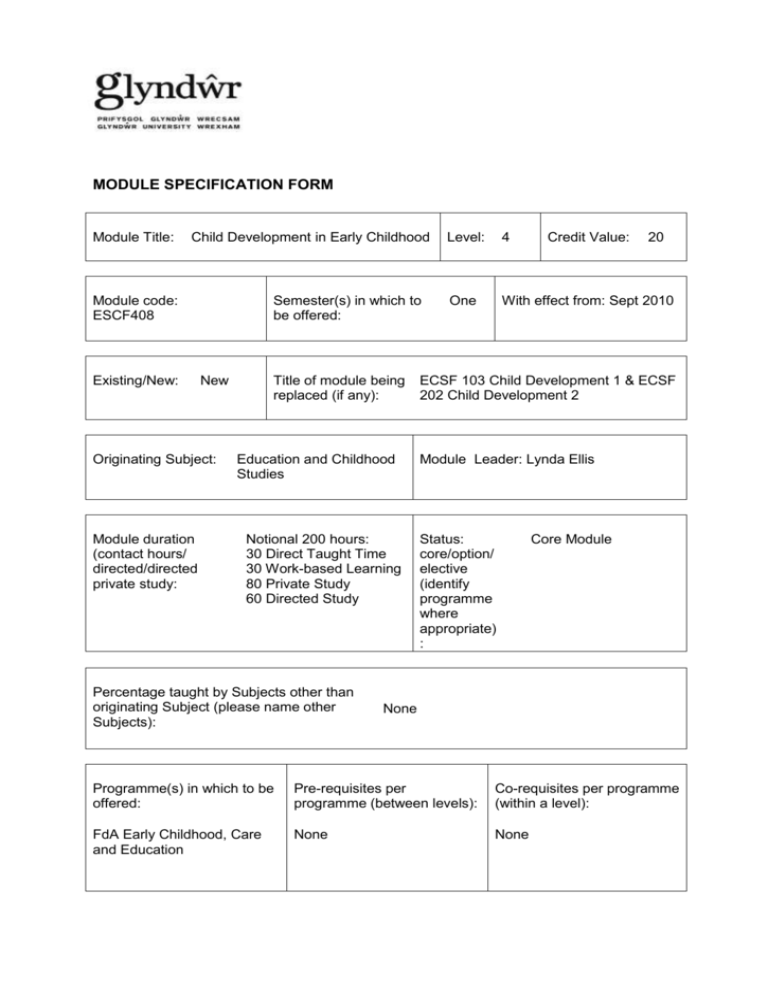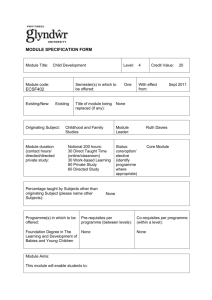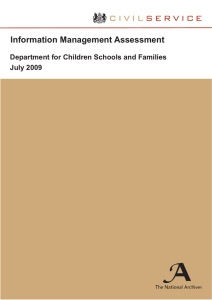
MODULE SPECIFICATION FORM
Module Title:
Child Development in Early Childhood
Module code:
ESCF408
Existing/New:
Semester(s) in which to
be offered:
New
Originating Subject:
Module duration
(contact hours/
directed/directed
private study:
Title of module being
replaced (if any):
Education and Childhood
Studies
Notional 200 hours:
30 Direct Taught Time
30 Work-based Learning
80 Private Study
60 Directed Study
Percentage taught by Subjects other than
originating Subject (please name other
Subjects):
Level:
4
Credit Value:
20
One
With effect from: Sept 2010
ECSF 103 Child Development 1 & ECSF
202 Child Development 2
Module Leader: Lynda Ellis
Status:
core/option/
elective
(identify
programme
where
appropriate)
:
Core Module
None
Programme(s) in which to be
offered:
Pre-requisites per
programme (between levels):
Co-requisites per programme
(within a level):
FdA Early Childhood, Care
and Education
None
None
Module Aims:
This module will enable students to:
Show a broad and relevant understanding of the main developmental theories with
regards to children from birth to eight years.
Relate knowledge and understanding of child development to practice, enhancing
their abilities to provide effectively for individual children’s needs within the context of
an early year’s/educational setting.
Develop a practical awareness of how child development relates to children’s
learning.
Expected Learning Outcomes
At the end of this module, students should be able to:
1. Acknowledge the role that theory has to play on their understanding of child
development and describe some of the ways it impacts on childcare/educational
practice.
2. Identify the major theories of child development and apply that learning to the workplace.
3. Analyse how practitioners can use knowledge of child development to enable more
effective provision for all children relative to their individual needs and interests.
4. Explain how an understanding of child development impacts on how children learn in
the Early Years.
Transferable/Key Skills and other attributes:
Communicate effectively
Writing skills
Sharing ideas
Evaluation and reflection
Improving own practice
Interpretation and analysis of information
Observation
Assessment: please indicate the type(s) of assessment (eg examination, oral, coursework,
project) and the weighting of each (%). Details of indicative assessment tasks must be
included.
1. Summarise the work of two child development theorists using examples from your setting
to show how learning from the theories may be reflected in practice.
2. Write two case studies (no more than 500 words each), demonstrating how your
knowledge of child development (in areas given below) has helped you to meet the
learning needs of a child(ren) within your setting.
Case study 1 - social and emotional development
Case study 2 - language and communication development
Write an accompanying reflection (1000 words) which describes:
Context
Personal learning
Theoretical underpinning
Assessmen
t
Learning
Outcomes to
be met
Type of assessment
Weightin
g
Duration
(if exam)
Word count
or equivalent
if appropriate
1.
1,2
Essay
50%
N/A
2000
2.
3,4
2 x Case study &
Reflection
50%
N/A
2 x 500words
+ 1000words
Learning and Teaching Strategies:
This module is delivered through taught classroom sessions. This will involve working alone,
in groups, with peers, tutors and colleagues.
Sessions will comprise of the presentation of information, reading, practical activities and
discussion. Work-based learning and self-directed tasks form a large part of this module and
are used to inform the assessment and materials used in the classroom.
Students will receive further support through access to the virtual learning environments both
at Yale and Glyndwr (Moodle).
Work-based learning:
During this module students will be expected carry out the following tasks within the workplace:
Reflect on their own practice in light of the learning from this module.
Start to recognise and record elements of the developmental theories in their
observations of children.
To observe how their knowledge of child development informs the learning activities
provided for children within the setting.
Syllabus outline:
Below is an overview of the module syllabus in a rough order of delivery, please note that
each area may cover more than one session.
1) Understanding theory and development - Gives the students an overview of why it is
important to think about theory and development in general.
2) Theories of development – Gives an overview of the main theorists and theories
relevant to the development of children.
3) Theories of development – Explores how theories of development have influenced
modules of learning employed in the Early Years.
4) Policies, procedures and legislation - How current thinking and research are
influencing practice from legislation to policies and procedures for all those working
with children with consideration of how this might impact upon children’s overall
development and learning.
5) Key areas of development - Explores how the key areas of development impact upon
the child’s overall development and learning i.e. physical development, social and
emotional development, cognitive development, language and communication etc.
6) Strategies to develop children’s independence, self-reliance and self-esteem and the
importance of this to support children’s development and learning.
Bibliography
Essential reading:
Macleod-Brudnell, I. and Kay, J. (2008), Advanced Early Years. Harlow: Heinemann
Other indicative reading:
Bradford, H. and Green, S. (2008), Communication, Language and Literacy in the Early
Years Foundation Stage, Oxon: Routledge
Bruner, J. (1987), Making Sense, the child’s construction of the world. London: Methuen
Daly, M., Byers, E. and Taylor, W. (2006), Understanding Early Years Theory in Practice.
Oxford: Heinemann
Doherty J. and Hughes, M. (2009), Child Development: theory and practice 0-11.
Harlow:Pearson Longman
Donaldson, M. (1978), Children’s Minds. London: Croon Helm
Meggitt, C. (2006), Child Development, An Illustrated guide. Oxford: Heinemann
Mooney, C. G. (2000), Theories of Childhood: An Introduction to Dewey, Montessori,
Erickson, Piaget and Vygotsky. St. Paul MN, USA: Redleaf Press
Nutbrown, C. (1996), Threads of Thinking. London: Hodder & Stoughton
Pound, L. (2005), How Children Learn. London: Step Forward Publishing Ltd
Pound, L. (2008), How Children Learn 2. London: Step Forward Publishing Ltd
Robinson, M. (2008), Child Development 0-8: A journey through the early years.
Maidenhead:Open University Press
Schaffer, H. R. (2004), Introducing Child Psychology. Oxford: Blackwell Publishing
Journals:
Child Development
Early Years Educator.
Journal of Early Childhood Research
Electronic Sources: (@ February 2010):
DCSF Effective Provision of Pre-School Education (EPPE) project
http://www.dcsf.gov.uk/rsgateway/DB/RRP/u013144/index.shtml
DCSF National Strategies EYFS http://nationalstrategies.standards.dcsf.gov.uk/earlyyears
Early Years – An International Journal of Research and Development. www.tactyc.org.uk
National Children’s Bureau http://www.ncb.org.uk/
Open Eye http://openeyecampaign.wordpress.com/
WAG - Early Years – Childcare Strategy for Wales - Flying Start - Foundation Phase –
http://wales.gov.uk/topics/educationandskills/policy_strategy_and_planning/1040
wag/?lang=en






